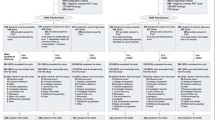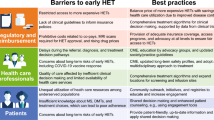Abstract
Natalizumab (Tysabri®) is highly efficacious in controlling disease activity in relapsing multiple sclerosis (MS) patients. As it is one of the more recent therapies for MS, there remains a need for long-term safety and efficacy data of natalizumab in a clinical practice setting. The Tysabri observational program (TOP) is an open-label, multicenter, multinational, prospective observational study, aiming to recruit up to 6,000 patients with relapsing-remitting MS from Europe, Canada and Australia. The objectives of this study are to collect long-term safety and efficacy data on disease activity and disability progression. We report here the interim results of the 563 patients included in TOP between December 2007 and 2012 from Belgium. This patient cohort was older at baseline, had longer disease duration, higher neurological impairment, and a higher baseline annualized relapse rate, when compared to patients included in the pivotal phase III AFFIRM trial. Nevertheless, the efficacy of natalizumab was comparable. The annualized relapse rate on treatment was reduced by 90.70 % (p < 0.0001) with a cumulative probability of relapse of 26.87 % at 24 months. The cumulative probabilities of sustained disability improvement and progression at 24 months were 25.68 and 9.01 %, respectively. There were no new safety concerns over the follow-up period. Two cases of progressive multifocal leukoencephalopathy were diagnosed. Our results are consistent with other observational studies in the post-marketing setting.






Similar content being viewed by others
References
Polman CH et al (2006) A randomized, placebo-controlled trial of natalizumab for relapsing multiple sclerosis. N Engl J Med 354(9):899–910
Rudick RA et al (2006) Natalizumab plus interferon beta-1a for relapsing multiple sclerosis. N Engl J Med 354(9):911–923
Sandborn WJ et al (2005) Natalizumab induction and maintenance therapy for Crohn’s disease. N Engl J Med 353(18):1912–1925
Phan-Ba R et al (2012) MRI preclinical detection and asymptomatic course of a progressive multifocal leucoencephalopathy (PML) under natalizumab therapy. J Neurol Neurosurg Psychiatry 83(2):224–226
Butzkueven H et al (2014) Efficacy and safety of natalizumab in multiple sclerosis: interim observational programme results. J Neurol Neurosurg Psychiatry. doi:10.1136/jnnp-2013-306936
Piehl F et al (2011) Swedish natalizumab (Tysabri) multiple sclerosis surveillance study. Neurol Sci 31(Suppl 3):289–293
Oturai AB et al (2009) Efficacy of natalizumab in multiple sclerosis patients with high disease activity: a Danish nationwide study. Eur J Neurol 16(3):420–423
Melin A et al (2012) Effect of natalizumab on clinical and radiological disease activity in a French cohort of patients with relapsing-remitting multiple sclerosis. J Neurol 259(6):1215–1221
Outteryck O et al (2010) Demographic and clinic characteristics of French patients treated with natalizumab in clinical practice. J Neurol 257(2):207–211
Fernandez O et al (2012) Natalizumab treatment of multiple sclerosis in Spain: results of an extensive observational study. J Neurol 259(9):1814–1823
Sangalli F et al (2010) Efficacy and tolerability of natalizumab in relapsing-remitting multiple sclerosis patients: a post-marketing observational study. Neurol Sci 31(3):299–302
Prosperini L et al (2010) Natalizumab treatment in multiple sclerosis: the experience of S. Andrea MS Centre in Rome. Neurol Sci 31(3):303–307
Putzki N et al (2010) Efficacy of natalizumab in second line therapy of relapsing-remitting multiple sclerosis: results from a multi-center study in German speaking countries. Eur J Neurol 17(1):31–37
Holmen C et al (2011) A Swedish national post-marketing surveillance study of natalizumab treatment in multiple sclerosis. Mult Scler 17(6):708–719
Bloomgren G et al (2012) Risk of natalizumab-associated progressive multifocal leukoencephalopathy. N Engl J Med 366(20):1870–1880
Kappos L et al (2012) Long-term safety and efficacy and association between baseline treatment history and postbaseline relapses in multiple sclerosis patients treated with natalizumab in the TYSABRI(R) observational program (TOP) (P04.134). Neurology 78:P04.134
Spelman (2012) Comparison of natalizumab and interferon-beta/glatiramer acetate efficacy using a propensity-matched registry data (S133). Mult Scler J 18(4 suppl):9–53
Hutchinson M et al (2009) The efficacy of natalizumab in patients with relapsing multiple sclerosis: subgroup analyses of AFFIRM and SENTINEL. J Neurol 256(3):405–415
Conflict of interest
The natalizumab Observational Program is funded by Biogen Idec. Although the authors had full editorial control, Biogen Idec reviewed the manuscript prior to submission and provided feedback to the authors.
V. van Pesch: has received travel grants, honoraria for consultancy and lectures from Bayer-Schering, Biogen Idec, Merck Serono, Novartis, Sanofi-Aventis-Genzyme and Teva.
E. Bartholomé: EB is Chief Medical Officer of Medical Device Works. EB has received scientific and travel grants from Abbvie, Bayer Schering, Biogen Idec, Novartis, Sanofi-Aventis-Genzyme, Merck Serono and TEVA. EB has had consultancy contracts with Biogen Idec, Novartis, Sanofi-Aventis-Genzyme, and Merck Serono. EB is or has been member of Advisory Boards for Biogen Idec, Novartis, Sanofi-Aventis-Genzyme, and Serono.
V. Bissay: has been a member of an Advisory Board for Biogen Idec and has received travel grants from Bayer Schering, Biogen Idec, Novartis, Merck Serono and TEVA.
O. Bouquiaux: has received scientific grants from Biogen Idec and Novartis.
M. Bureau: has no disclosures to report.
Jo Caekebeke: scientific and/or travel grants from Abboth, GSK, Bayer Schering, Biogen Idec, Novartis, Merck Serono and TEVA.
J. Debruyne: has received grants from Novartis, Biogen Idec, Bayer Schering, Merck Serono and Teva.
I. Declercq: no disclosures reported.
D. Decoo: has received scientific and travel grants from Abbvie, Bayer Schering, Biogen Idec,
Novartis, Sanofi-Aventis/Genzyme, Merck Serono and Teva. DD has consultancy contracts with Biogen Idec, Novartis, Sanofi-Aventis/Genzyme and GLG. DD is or has been member of Advisory Boards for Biogen Idec, Novartis, Sanofi-Aventis-Genzyme.
P. Denayer: no disclosures to report.
E. Desmet: has received grants from Biogen Idec and Teva.
B. D’Hooghe: has been a consultant for Biogen Idec, Bayer Schering, Merck Serono, Allergan, Novartis and Genzyme Sanofi.
B. Dubois: is a Clinical Investigator of the Fund for Scientific Research (FWO-Vlaanderen), and is supported by the Merck Chair Multiple Sclerosis. She also received an educational grant from Novartis.
M. Dupuis: no disclosures reported.
S. El Sankari: has received travel grants from Biogen Idec, Bayer Schering, Merck Serono, Teva, Novartis and Sanofi Genzyme. SE is a member of an advisory board for Biogen Idec.
K. Geens: has received scientific and/or travel grants from Abboth, Glaxo-Smith-Kline, Bayer Schering, Biogen Idec, Novartis, Sanofi-Aventis-Genzyme, Merck Serono and TEVA.
D. Guillaume: DG has received scientific and travel grants from Bayer Schering, Biogen Idec, Novartis, Sanofi-Aventis and Sanofi-Genzyme, Merck Serono and TEVA. DG has been member of Advisory Boards for Biogen Idec, Novartis, Sanofi-Genzyme.
W. van Landeghem: has received scientific and/or travel grants from Abboth, Allergan, Bayer, Biogen Idec, Boehringer, Cyberonics, Glaxo-Smith-Kline, Ipsen, Medelec, Merck Serono, Novartis, Sanofi-Aventis-Genzyme, UCB and TEVA.
A. Lyssandropoulos: has received scientific and travel grants from Bayer, Biogen Idec,
Sanofi-Aventis-Genzyme, Serono and TEVA. AL has had consultancy contracts with Bayer and Novartis. AL is or has been the member of Advisory Boards for Biogen Idec and Sanofi-Aventis-Genzyme.
A. Maertens: has received travel grants from Biogen Idec, Bayer Schering, Merck Serono, Teva, Novartis and Sanofi Genzyme.
R. Medaer: no disclosures reported.
A. Melin: no disclosures reported.
K. Peeters: no disclosures reported.
R. Phan–Ba: has served at Scientific Advisory Boards for Genzyme Sanofi Aventis and has received funding for travel from Genyzme–Sanofi Aventis, Bayer Schering Pharma and Biogen Idec.
C. Retif: no disclosures reported.
P. Seeldrayers: is a member of Advisory Boards for Biogen Idec, Novartis, Merck Serono, Bayer Schering, Teva and Sanofi Genzyme. PS has received travel grant and research support from Biogen Idec.
A. Symons: has been a member of advisory boards of Biogen Idec, Genzyme and Merck Serono. AS is currently an employee of Biogen Idec.
E. Urbain: has received scientific and travel grants from Biogen Idec, Bayer Schering, Sanofi-Aventis, Novartis and Merck Serono.
P. Vanderdonckt: has received scientific and/or travel grants from Abboth, GSK, Bayer Schering, Biogen Idec, Novartis, Merck Serono, TEVA and Cyberonics.
E. Van Ingelghem: no disclosures reported.
L Vanopdenbosch: has received honoraria for consultancy and lectures, educational and occasional institutional grants by Novartis, Merck Serono, Teva, Biogen Idec, Bayer Schering and UCB. LV serves on the editorial board of Tijdschrift van Neurologie en Neurochirurgie.
E. Vanroose: has received travel grants from Biogen Idec, Bayer Schering, Merck Serono, Teva, Novartis and Sanofi Genzyme.
B. Van Wijmersch: has received scientific and travel grants from Biogen Idec, Novartis, Sanofi-Aventis-Genzyme, TEVA, Merck Serono and Bayer Schering.
B. Willekens: has served as a member of advisory boards for Biogen Idec, Genzyme, Bayer Schering, Merck Serono, Novartis; has received honoraria for lectures from Biogen Idec, Novartis and Bayer Schering; has received travel grants from Biogen Idec, Merck Serono, Bayer schering, Novartis and TEVA.
C. Willems: has no disclosures to report.
C. Sindic: has received honoraria for consultancy and lectures, educational and research grants from Bayer-Schering, Biogen Idec, GSK Biological Vaccines, Merck Serono, Novartis, Sanofi-Aventis and Teva.
Author information
Authors and Affiliations
Corresponding author
Additional information
On behalf of the Belgian Study Group for Multiple Sclerosis.
Electronic supplementary material
Below is the link to the electronic supplementary material.
Rights and permissions
About this article
Cite this article
van Pesch, V., Bartholomé, E., Bissay, V. et al. Safety and efficacy of natalizumab in Belgian multiple sclerosis patients: subgroup analysis of the natalizumab observational program. Acta Neurol Belg 114, 167–178 (2014). https://doi.org/10.1007/s13760-014-0308-9
Received:
Accepted:
Published:
Issue Date:
DOI: https://doi.org/10.1007/s13760-014-0308-9




